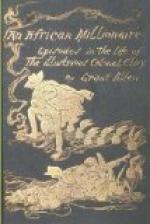To say the truth, Charles was beside himself with anger. He took the elevator down to the “Bureau,” as they call it, and complained to the manager. The manager, a sharp-faced New Yorker, smiled as he remarked in a nonchalant way that guests with valuables were required to leave them in charge of the management, in which case they were locked up in the safe and duly returned to the depositor on leaving. Charles declared somewhat excitedly that he had been robbed, and demanded that nobody should be allowed to leave the hotel till the dispatch-box was discovered. The manager, quite cool, and obtrusively picking his teeth, responded that such tactics might be possible in an hotel of the European size, putting up a couple of hundred guests or so; but that an American house, with over a thousand visitors—many of whom came and went daily—could not undertake such a quixotic quest on behalf of a single foreign complainant.
That epithet, “foreign,” stung Charles to the quick. No Englishman can admit that he is anywhere a foreigner. “Do you know who I am, sir?” he asked, angrily. “I am Sir Charles Vandrift, of London—a member of the English Parliament.”
“You may be the Prince of Wales,” the man answered, “for all I care. You’ll get the same treatment as anyone else, in America. But if you’re Sir Charles Vandrift,” he went on, examining his books, “how does it come you’ve registered as Mr. Peter Porter?”
Charles grew red with embarrassment. The difficulty deepened.
The dispatch-box, always covered with a leather case, bore on its inner lid the name “Sir Charles Vandrift, K.C.M.G.,” distinctly painted in the orthodox white letters. This was a painful contretemps: he had lost his precious documents; he had given a false name; and he had rendered the manager supremely careless whether or not he recovered his stolen property. Indeed, seeing he had registered as Porter, and now “claimed” as Vandrift, the manager hinted in pretty plain language he very much doubted whether there had ever been a dispatch-box in the matter at all, or whether, if there were one, it had ever contained any valuable documents.
We spent a wretched morning. Charles went round the hotel, questioning everybody as to whether they had seen his dispatch-box. Most of the visitors resented the question as a personal imputation; one fiery Virginian, indeed, wanted to settle the point then and there with a six-shooter. Charles telegraphed to New York to prevent the shares and coupons from being negotiated; but his brokers telegraphed back that, though they had stopped the numbers as far as possible, they did so with reluctance, as they were not aware of Sir Charles Vandrift being now in the country. Charles declared he wouldn’t leave the hotel till he recovered his property; and for myself, I was inclined to suppose we would have to remain there accordingly for the term of our natural lives—and longer.
That night again we spent at the Lakeside Hotel. In the small hours of the morning, as I lay awake and meditated, a thought broke across me. I was so excited by it that I rose and rushed into my brother-in-law’s bedroom. “Charles, Charles!” I exclaimed, “we have taken too much for granted once more. Perhaps Elihu Quackenboss carried off your dispatch-box!”




